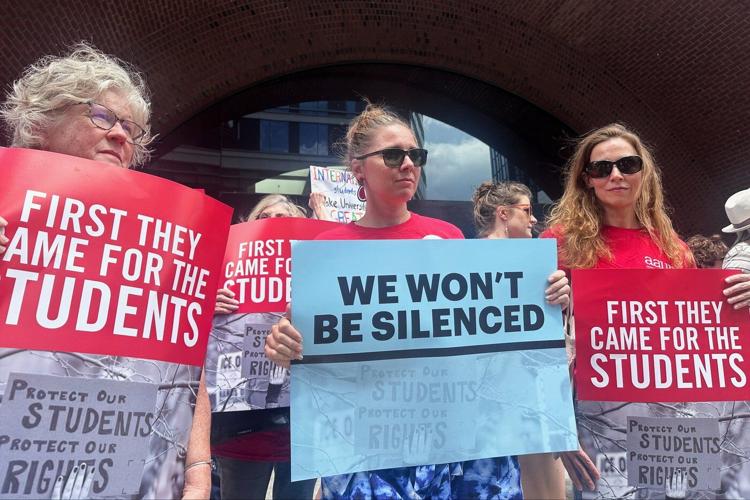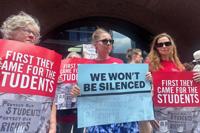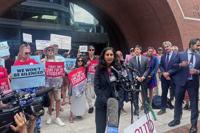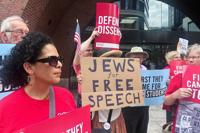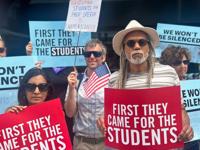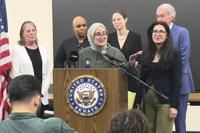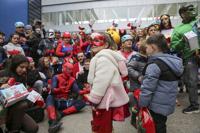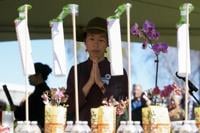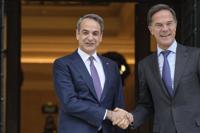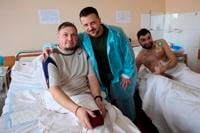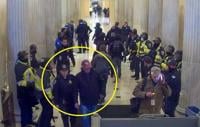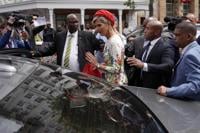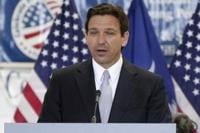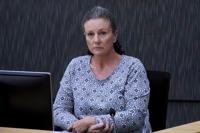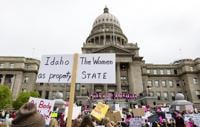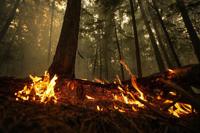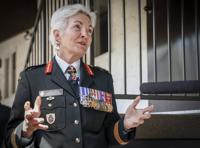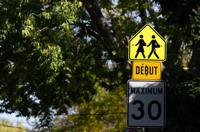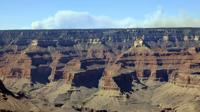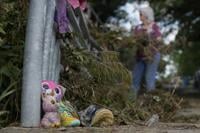BOSTON (AP) — Plaintiffs in a lawsuit challenging the Trump administration's campaign of arresting and deporting college faculty and students who participated in pro-Palestinian demonstrations spent the first few days of the trial showing how the crackdown silenced scholars and targeted more than 5,000 protesters.
The lawsuit, filed by several university associations, is one of the first against President Donald Trump and members of his administration to go to trial. Plaintiffs want U.S. District Judge William Young to rule that the policy violates the First Amendment and the Administrative Procedure Act, a law that governs how federal agencies develop and issue regulations.
The government argues that no such policy exists and that it is enforcing immigration laws legally to protect national security.
Investigating protesters
One of the key witnesses was Peter Hatch, who works for the Homeland Security Investigations unit of Immigration and Customs Enforcement. Over two days of testimony, Hatch told the court a “Tiger Team” was formed in March — after two executive orders that addressed terrorism and combating antisemitism — to investigate people who took part in the protests.
Hatch said the team received as many as 5,000 names of protesters and wrote reports on about 200 who had potentially violated U.S. law. The reports, several of which were shown in court Thursday, included biographical information, criminal history, travel history and affiliations with pro-Palestinian groups as well as press clips and social media posts on their activism or allegations of their affiliation with Hamas or other anti-Israel groups.
Until this year, Hatch said, he could not recall a student protester being referred for a visa revocation.
“It was anything that may relate to national security or public safety issues, things like: Were any of the protesters violent or inciting violence? I think that’s a clear, obvious one,” Hatch testified. “Were any of them supporting terrorist organizations? Were any of them involved in obstruction or unlawful activity in the protests?”
Among the report subjects were Palestinian activist and Columbia University graduate , who was released last month after 104 days in federal immigration detention. Khalil has become a symbol of clampdown on the protests.
Another was Tufts University student Rumeysa Ozturk, from a Louisiana facility. She spent six weeks in detention after she was of a Boston suburb. She says she was illegally detained following an op-ed she cowrote last year criticizing the school’s response to the war in Gaza.
Hatch also acknowledged that most of the names came from Canary Mission, a group that says it documents people who “promote hatred of the U.S.A., Israel and Jews on North American college campuses.” The was another source, he said.
Hatch said most of the leads were dropped when investigators could not find ties to protests and the investigations were not inspired by a new policy but rather a procedure in place at least since he took the job in 2019.
What is Canary Mission?
Weeks before Khalil’s arrest, a spokesperson for Betar told The Associated Press that the activist topped a list of foreign students and faculty from nine universities that it submitted to officials, including Secretary of State Marco Rubio, who made the decision to revoke Khalil’s visa.
The Department of Homeland Security said at the time that it was not working with Betar and refused to answer questions about how it was treating reports from outside groups.
In March, speculation grew that administration officials were using Canary Mission to identify and target student protesters. That’s when immigration agents arrested Ozturk.
Canary Mission has denied working with administration officials, while noting speculation that its reports led to that arrest and others.
While Canary Mission prides itself on outing anyone it labels as antisemitic, its leaders refuse to identify themselves and its operations are secretive. News reports and tax filings have linked the site to a nonprofit based in the central Israeli city of Beit Shemesh. But journalists who have visited the group’s address, listed in documents filed with Israeli authorities, have found a locked and seemingly empty building.
In recent years, news organizations have reported that several wealthy Jewish Americans made cash contributions to support Canary Mission, disclosed in tax paperwork filed by their personal foundations. But most of the group’s funding remains opaque, funneled through a New York-based fund that acts as a conduit for Israeli causes.
Were student protesters targeted?
Attorneys for the plaintiffs pressed a State Department official Friday over whether protests were grounds for revoking a student's visa, repeatedly invoking several cables issued in response to Trump's executive orders as examples of policy guidance.
But Maureen Smith, a senior adviser in the State Department’s Bureau of Consular Affairs, said protest alone wasn't a critical factor. She wasn’t asked specifically about pro-Palestinian protests.
“It’s a bit of a hypothetical question. We would need to look at all the facts of the case,” she said. “If it were a visa holder who engages in violent activity, whether it's during a protest or not — if they were arrested for violent activity — that is something we would consider for possible visa revocation.”
Smith also said she didn't think a student taking part in a nonviolent protest would be a problem but said it would be seen in a “negative light” if the protesters supported terrorism. She wasn't asked to define what qualified as terrorism nor did she provide examples of what that would include.
Scholars scared by the crackdown
The trial opened with Megan Hyska, a green card holder from Canada who is a philosophy professor at Northwestern University, detailing how efforts to deport Khalil and Ozturk prompted her to scale back her activism, which had included supporting student encampments and protesting in support of Palestinians.
“It became apparent to me, after I became aware of a couple of high-profile detentions of political activists, that my engaging in public political dissent would potentially endanger my immigration status,” Hyska said.
Nadje Al-Ali, a green card holder from Germany and professor at Brown University, said that after the arrests of Khalil and Ozturk, she canceled a planned research trip and a fellowship to Iraq and Lebanon, fearing that “stamps from those two countries would raise red flags” upon her return. She also declined to take part in anti-Trump protests and dropped plans to write an article that was to be a feminist critique of Hamas.
“I felt it was too risky,” Al-Ali said.
___
Associated Press writer Adam Geller in New York contributed to this report.

